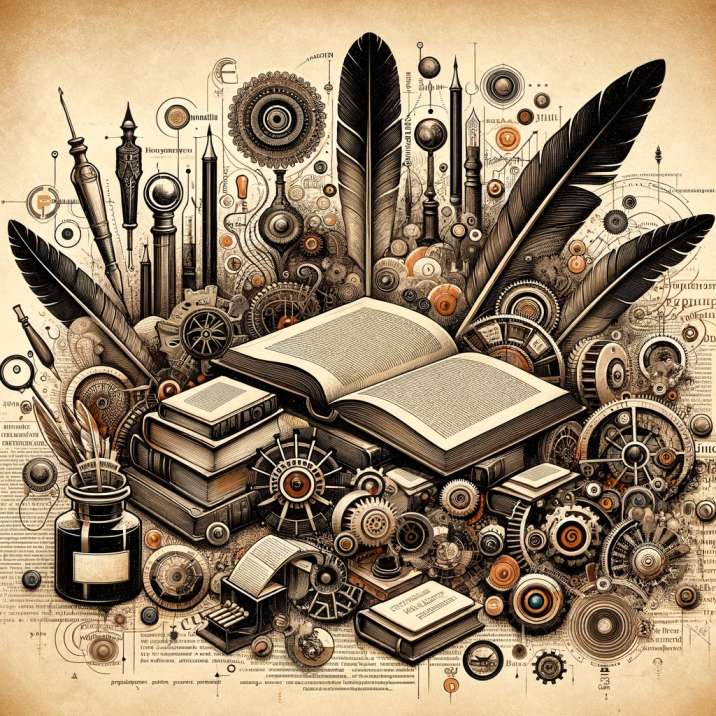In the early 20th century, a groundbreaking movement emerged in the realm of literary criticism, known as Russian Formalism. This movement, originating in Russia, marked a significant departure from traditional literary scholarship, introducing a novel approach that emphasized the artistic form and intrinsic features of literary works. Russian Formalism was characterized by its analytical rigor, focusing on the ‘how’ rather than the ‘what’ of literature – a shift that brought the structural aspects of texts into the limelight.
At its core, Russian Formalism proposed that the essence of literature was in its use of language and form to create unique effects and experiences, independent of content, authorial intent, or moral and social context. This perspective was revolutionary, challenging existing norms and conventions in literary analysis and criticism. It led to the development of several key concepts and methodologies that have had a lasting impact on how literary texts are studied and interpreted.
Key Takeaways: Russian Formalism
- Fundamental Principles of Russian Formalism: At its heart, Russian Formalism was a radical shift from conventional literary analysis, focusing on the structure, form, and use of language in literature. It marked a departure from interpreting texts based on historical, social, or biographical contexts, instead emphasizing how a text constructs meaning through its form.
- Historical Emergence and Context: Russian Formalism arose during a tumultuous period in early 20th-century Russia, reflecting a broader intellectual movement that sought new ways of understanding art and culture. This context is crucial for comprehending the motivations and perspectives of the Formalists.
- Core Concepts and Theoretical Innovations: Central to Russian Formalism were concepts like “defamiliarization” (ostranenie), which aimed to make the familiar seem strange to enhance perception; “literariness”, focusing on what makes a text distinctly literary; and a rigorous analysis of literary devices and techniques.
- Influential Figures and Contributions: The movement boasted prominent thinkers like Viktor Shklovsky, Roman Jakobson, and Boris Eichenbaum, each contributing unique ideas and perspectives that shaped Russian Formalism.
- Impact on Literary Criticism and Legacy: Russian Formalism had a profound influence on later theories, including Structuralism and New Criticism. Its emphasis on the autonomy of the text and detailed analysis of literary form and language reshaped literary criticism.
- Relevance in Contemporary Literary Analysis: Despite its historical roots, Russian Formalism’s principles continue to resonate in modern literary studies, offering valuable tools for textual analysis and understanding the mechanics of literary expression.
Historical Context: The Emergence of Russian Formalism in Early 20th-Century Russia
The birth of Russian Formalism in the early 20th century was not an isolated intellectual occurrence. It was deeply intertwined with the broader sociopolitical and cultural upheavals happening in Russia at the time. This period was marked by significant turmoil and change, including the Russian Revolution, which profoundly impacted the nation’s social fabric and intellectual landscape.
1. Intellectual Ferment and Reaction Against Traditional Criticism:
- Russian Formalism emerged during a time of intense intellectual ferment in Russia. There was a growing dissatisfaction with traditional literary criticism, which often focused more on the author’s biography, historical context, and moralistic interpretations of literary works. Formalists sought to redirect the focus from the author and social context to the text itself, arguing that the essence of literature lies in its form and the techniques employed by the writer.
2. Influence of Symbolism and Futurism:
- The movement was also influenced by contemporary artistic trends like Symbolism and Futurism. These movements emphasized the autonomy of art and the importance of form and style. The Formalists extended these ideas to literature, advocating for a scientific approach to analyzing the aesthetics of texts.
3. The Russian Revolution and Its Aftermath:
- The Russian Revolution of 1917 and the subsequent establishment of the Soviet Union created an environment of political and social upheaval. This environment was conducive to radical thinking and experimentation in various fields, including literature and criticism. However, it also meant that Formalists often had to navigate a tricky political landscape, as their work was sometimes seen as detached from social realities.
4. Interaction with Western Philosophical Thought:
- The intellectual climate in Russia during this time was not just shaped by internal factors but also by interactions with Western philosophical thought. Russian Formalists were aware of and influenced by various Western intellectual movements, integrating and reinterpreting these ideas within the context of Russian literature and criticism.
In summary, the emergence of Russian Formalism was a response to the dynamic and tumultuous intellectual and sociopolitical landscape of early 20th-century Russia. It represented a radical break from traditional literary criticism, influenced by contemporary artistic movements, and was shaped within the context of significant historical events.
Core Concepts and Theoretical Innovations of Russian Formalism
Russian Formalism introduced a range of innovative concepts and approaches that fundamentally altered the landscape of literary criticism. These ideas focused on the intrinsic features of literary texts, prioritizing form and technique over content and authorial intention.

1. Defamiliarization (Ostranenie):
- Coined by Viktor Shklovsky, one of the central figures of Russian Formalism, “defamiliarization” refers to the technique of presenting common objects or scenarios in an unfamiliar or strange way to make the reader perceive them more vividly. This concept was a cornerstone of Formalism, emphasizing how literary language disrupts ordinary perception and encourages deeper engagement with the text.
2. Literariness:
- Russian Formalists sought to define what makes a text ‘literary’. They focused on the concept of “literariness” – the idea that literature is distinguished not by its content but by its use of language and formal properties. This concept challenged the traditional views that considered the value of literature in its ability to express truth, moral lessons, or social and political themes.
3. The Autonomy of the Text:
- Formalists argued for the autonomy of the literary text, asserting that a work of literature should be studied and understood based on its internal mechanics rather than external context like the author’s biography or social and historical background. This approach marked a significant shift from the prevalent historical and biographical approaches to literary analysis.
4. Close Reading and Analysis of Literary Devices:
- Central to Russian Formalism was the Practice of “close reading”, a meticulous analysis of the text’s structure, style, and use of literary devices. Formalists dissected texts to understand how various elements like metaphor, rhythm, and narrative structure contribute to the overall effect of the work.
5. Critique of Narrative Techniques:
- The Formalists also contributed significantly to the analysis of narrative techniques. They explored how different narrative forms and perspectives influence the reader’s understanding and experience of the story.
These concepts and approaches marked a radical departure from the then-dominant ways of literary analysis, focusing attention on the technical aspects of literature and laying the groundwork for many modern critical theories. The Formalist methodology provided a new lens through which to view and appreciate the craftsmanship of literary works.
Influential Figures and Contributions in Russian Formalism
Russian Formalism was shaped by several key figures whose innovative ideas and critical analyses contributed significantly to the movement. Here, we will explore some of these influential thinkers and their contributions to Russian Formalism.
1. Viktor Shklovsky (1893-1984):
- Viktor Shklovsky is perhaps best known for introducing the concept of “defamiliarization” (ostranenie). His seminal essay “Art as Technique” (1917) argued that the purpose of art is to make the familiar appear strange to enhance perception. Shklovsky’s focus on the technique and form in literature was a pivotal contribution to Russian Formalism.
- He also explored the notion of “plot” versus “story” and how literary devices transform the simple material of a story into a complex literary plot.
2. Roman Jakobson (1896-1982):
- Roman Jakobson was a key figure in both Russian Formalism and later, Structuralism. His contributions to the study of linguistics and his theories on the functions of language had a profound impact on literary theory.
- Jakobson’s work in phonology and his concepts of metaphor and metonymy as fundamental modes of linguistic operation were influential in shaping Formalist thought.
3. Boris Eichenbaum (1886-1959):
- Boris Eichenbaum was another prominent Formalist, known for his essays on theory and methodology in literary criticism. He argued for the scientific study of literary art, emphasizing the need for a systematic and objective analysis of texts.
- Eichenbaum’s works, such as “The Theory of the ‘Formal Method'”, provided a detailed exposition of the principles and objectives of Russian Formalism.
4. Yuri Tynianov (1894-1943):
- Yuri Tynianov was influential in developing the Formalist approach to the study of literary history. He focused on the dynamic evolution of literary systems and the interrelation of various literary genres and styles.
- Tynianov’s work on the concept of “literary series” and “literary fact” contributed significantly to the understanding of the historical development of literary forms.
These individuals, among others, played crucial roles in the development of Russian Formalism, offering insightful critiques, theories, and methodologies that challenged existing norms in literary criticism. Their collective work laid the foundation for future literary theories and continued to influence the study of literature long after the decline of Formalism as a formal movement.
Certainly! For a blog post on Russian Formalism, a relevant table could be one that compares the key concepts of Russian Formalism with those of traditional literary criticism. This table will highlight the distinct approaches of Russian Formalism, contrasting them with the more conventional methods of literary analysis prevalent before its emergence.
Russian Formalism vs. Traditional Literary Criticism
| Aspect | Traditional Literary Criticism | Russian Formalism |
|---|---|---|
| Focus | Author’s biography, historical context | Textual form and structure |
| Analysis of Language | Language as a means to convey themes | Language as a mechanism of defamiliarization |
| Literary Devices | Often overlooked in favor of thematic analysis | Central to understanding the text |
| Narrative Structure | Viewed in terms of content and story | Analyzed in terms of plot construction |
| Authorial Intent | Considered vital for interpretation | Less emphasized in favor of textual autonomy |
| Purpose of Literature | To reflect reality, teach moral lessons | To create a unique experience through form |
| Methodology | Biographical, historical, moralistic analysis | Close reading, analysis of form and technique |
Impact and Legacy of Russian Formalism in Literary Criticism
Russian Formalism, despite its relatively brief period of prominence, left an indelible mark on the field of literary criticism. Its impact and legacy are evident in several key areas of literary studies and subsequent critical theories.
1. Influence on Structuralism and New Criticism:
- Russian Formalism paved the way for Structuralism, particularly in its approach to language and literary analysis. Structuralists, like Roland Barthes and Claude Lévi-Strauss, were influenced by Formalist ideas, especially the focus on underlying structures in texts.
- New Criticism, a movement in American literary criticism, also drew upon Formalist principles. New Critics emphasized close reading and the autonomy of the text, mirroring Formalist methodologies.
2. Methodological Innovations:
- Russian Formalism introduced methodological innovations that permanently transformed literary studies. Its emphasis on close reading, systematic analysis of literary devices, and focus on the text itself became foundational in modern literary criticism.
- The Formalist distinction between “fabula” (story) and “syuzhet” (plot) became a crucial tool in narrative analysis, influencing later narrative theories.
3. Impact on Film Theory and Cultural Studies:
- The Formalist influence extended beyond literature to film theory and cultural studies. Formalist concepts, particularly those related to narrative structure and technique, were adapted to analyze cinematic and cultural texts.
4. Enduring Theoretical Contributions:
- Terms and concepts introduced by Russian Formalists, such as Shklovsky’s “defamiliarization,” continue to be relevant in contemporary literary discourse.
- The Formalist emphasis on the literary function of language and the autonomy of the literary text have become fundamental aspects of literary theory and pedagogy.
5. Critique and Evolution:
- While influential, Russian Formalism was not without its critiques. It was often criticized for its perceived neglect of social and historical contexts in literature. However, these critiques led to the evolution and refinement of literary theories, incorporating insights from Formalism while addressing its limitations.
6. Legacy in Contemporary Literary Studies:
- Today, Russian Formalism’s legacy is evident in the continued emphasis on textual analysis in literary studies. It has inspired various contemporary critical approaches, including poststructuralism and deconstruction, which build upon or react against Formalist ideas.
In summary, Russian Formalism’s impact on literary criticism has been profound and lasting. Its innovative methodologies and concepts have shaped and enriched the study of literature, leaving a legacy that continues to influence both literary theory and practice.
Contemporary Application of Russian Formalism in Modern Literary Criticism
In the contemporary landscape of literary criticism, Russian Formalism continues to hold a significant place, both in academic discourse and in the practical analysis of texts. Its principles and methodologies, though developed over a century ago, remain relevant and are frequently employed in various forms of literary analysis today.
1. Enduring Principles in Textual Analysis:
- The Formalist emphasis on close reading and the dissection of literary form and techniques is still a fundamental practice in literary studies. Current literary analysis often incorporates Formalist approaches to understand the mechanics of how a text produces meaning and affects the reader.
2. Influence on Educational Curricula:
- Russian Formalism has influenced how literature is taught in educational settings. The focus on textual analysis, understanding of narrative structures, and examination of literary devices are integral to many literature courses, reflecting the enduring influence of Formalist principles.
3. Adaptation in Contemporary Theory:
- Contemporary literary theories, including poststructuralism and reader-response theory, have adapted and expanded upon Formalist ideas. While these theories may diverge from or critique certain Formalist tenets, the influence of Formalism is evident in their approach to textuality and interpretation.
4. Application in Digital Humanities:
- With the advent of digital humanities, Formalist methodologies have found new applications. Computational analysis of texts, for instance, often employs Formalist principles to analyze patterns, structures, and stylistic features in large corpora of literature.
5. Ongoing Scholarly Interest:
- Russian Formalism continues to be a subject of scholarly interest and debate. Academic research often revisits Formalist concepts, examining their relevance and application in contemporary literary studies, and exploring their historical context and intellectual legacy.
6. Broader Cultural Analysis:
- Beyond literature, the concepts developed by Russian Formalists have been adapted for the analysis of other cultural forms such as film, visual arts, and media, demonstrating the versatility and broad applicability of their ideas.
In conclusion, Russian Formalism’s contribution to the field of literary criticism has been immense and enduring. Its focus on the intricacies of form, technique, and language in literature has provided tools that continue to shape our understanding and appreciation of literary texts. As we look to the future of literary criticism, the principles of Russian Formalism will undoubtedly continue to play a crucial role in guiding and informing our analyses and interpretations.








